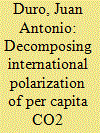|
|
|
Sort Order |
|
|
|
Items / Page
|
|
|
|
|
|
|
| Srl | Item |
| 1 |
ID:
099224


|
|
|
|
|
| Publication |
2010.
|
| Summary/Abstract |
The aim of this paper is to analyze the international polarization of per capita CO2 emissions with exogenous groups based on the Z-K measure (Zhang and Kanbur, 2001), whose main differential advantage lies on its factor-decomposability. In particular, we propose to use the factor decomposition based on Kaya (1989) by applying the methodology suggested by Duro and Padilla (2006). The main empirical results derived can be summarized as follows. First, the international polarization of emissions has significantly decreased over time during the period 1971-2006, when regional sets of nations based on the IEA structure are used; secondly, this decrease can be almost exclusively based on the reduction of the average dissimilarities among sets of countries and not due to a within-group cohesion process. Lastly, this reduction can be mainly attributed to the role of the affluence factor, and to a lesser extent, to the energy intensities. Thus, and given the values achieved for the different components, it seems that further reductions in the international polarization will continue be based on the economic convergence among groups.
|
|
|
|
|
|
|
|
|
|
|
|
|
|
|
|
| 2 |
ID:
125845


|
|
|
|
|
| Publication |
2013.
|
| Summary/Abstract |
The design of European mitigation policies requires a detailed examination of the factors explaining the unequal emissions in the different countries. This research analyzes the evolution of inequality in CO2 emissions per capita in the European Union (EU-27) in the period 1990-2009 and its explanatory factors. For this purpose, we decompose the Theil index of inequality into the contributions of the different Kaya factors. The decomposition is also applied to the inequality between and within groups of countries (North Europe, South Europe, and East Europe). The analysis shows an important reduction in inequality, to a large extent due to the smaller differences between groups and because of the lower contribution of the energy intensity factor. The importance of the GDP per capita factor increases and becomes the main explanatory factor. However, within the different groups of countries the carbonization index appears to be the most relevant factor in explaining inequalities. The policy implications of the results are discussed.
|
|
|
|
|
|
|
|
|
|
|
|
|
|
|
|
| 3 |
ID:
119797


|
|
|
|
|
| Publication |
2013.
|
| Summary/Abstract |
In this paper, we analyse the evolution of international mobility in per capita CO2 emissions for the period 1971-2007. This concept reveals the distribution's degree of entrenchment which is fundamentally different from other distribution concepts. In particular, we use several different synthetic mobility measures in order to capture the various perceptions of mobility proposed in the literature. This approach can be seen as complementary to the dynamics of distribution approach. The empirical analysis yields the following main results. First, the evolution observed varies according to the mobility index used. Second, when broader mobility indices are used, the most recent years analysed (i.e. 2000-2007) and the 1970s appear to be the most dynamic periods. Third, their decomposition reveals the major role played by the non-high income countries group. Fourth, the calculation of fictitious indices associated with the three major decomposition components of general mobility indicates that exchange (i.e. changes in position) and dispersion (i.e. distribution effects) have typically been the most important mobility factors. Finally, there does not seem to be a clear, convincing relationship between mobility and the evolution of inequality, which to a certain extent underscores the need to carry out a differential analysis for mobility. The results obtained have some implications in terms of analysis and environmental policy.
|
|
|
|
|
|
|
|
|
|
|
|
|
|
|
|
|
|
|
|
|